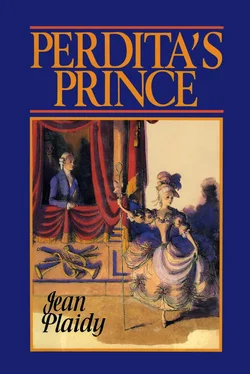The indignity of it all! But it had to be done otherwise the cry would go up: ‘Flog ’em.’ And their parents – the King and Queen of England – would inspect the little loaves of bread that had been made with their own wheat and the Prince of Wales had been infuriated to see that George III paid more attention to this bread produced by his sons than to matters of state.
‘I must have an establishment of my own,’ declared the Prince.
‘It’s ridiculous that you should be denied it,’ soothed Fred.
‘I shall demand it.’ The Prince rose and was about to strut across the room when his eye caught a dainty figure crossing the green on her way to the Queen’s Lodge. He was immediately at the window. ‘By God,’ he cried. ‘She’s a beauty.’
Frederick murmured agreement.
She was small, dainty and dark; and suddenly it seemed as though by instinct she raised her eyes to the window where the two Princes stood watching her.
George immediately bowed. She stood still for a moment, dropping an enchanting curtsey and then turning away, sped across the lawn.
‘One of our mother’s maids of honour,’ said George.
‘How did our mother allow such a charmer to get in?’
‘Like Homer, she nodded,’ laughed the Prince. ‘And let us be thankful for it.’
‘Us?’
‘I, because I intend to know more of the lady; and you because you will be so delighted in my good fortune.’
‘Do you think, George …’
George looked astonished. Of course he would succeed with the lady. Wasn’t he the most handsome, the most desirable young man in England? Wasn’t he the Prince of Wales?
Frederick hastily agreed: ‘Yes, of course, George, but our father …’
‘By God,’ cried the Prince, ‘I thought I’d made it clear to you that I have had enough of this treatment. Everything is going to be different from now on. I am seventeen years old.’
Frederick, at sixteen, looked suitably impressed.
‘Time, dear brother, to have left childhood behind and if our miserly parents will not allow me an establishment at least I shall have a life of my own.’
* * *
In the Queen’s drawing room the royal family was assembled for the evening concert. These concerts took place twice a week, on the King’s orders, and every member of the family was expected to attend or the King would want to know the reason why. Only baby Sophie, not yet two years old, was spared. Even three-year-old Mary was there, seated on a foot-stool at her mother’s feet while Queen Charlotte, pregnant with the child who would shortly make its appearance and bring the number of royal offspring to thirteen, industriously worked on her embroidery.
The King was comparatively content on occasions like this. It was while he sat with his family – all outwardly docile – while he listened to the excellent performance of some piece by Handel, that he could forget his anxieties. There were many of these. The trouble growing steadily worse over the American colonies; the conflict among his ministers, the growing truculence of the Prince of Wales; and worst of all the voices in his head which would not leave him alone, which mischievously mocked him, starting a train of thought and suddenly snatching it away so that he could not remember what had been in his mind a moment before, malicious voices which whispered to him: ‘George, are you going mad?’
But here in the drawing room with his family seated quietly about him and the Queen looking placid, as she always did when pregnant, listening to the mastery of Mr Papendiek with his flute and Mr Cramer at the harpsichord and the Cervettos – father and son – miraculously performing on their violins, he felt more at peace than at any other time.
He let his eyes linger on the younger children; he sometimes wished that they did not have to grow up. The arch-trouble maker was his eldest son and as Frederick was his intimate companion that made a pair of them. Young William was only fourteen; he would get him off to sea as soon as possible; that would provide some necessary discipline. Twelve-year-old Edward should go to Germany – as should the other boys, except the Prince of Wales of course. There would be an outcry if he were sent out of England; and he had heard that his son had expressed very strong opinions about that too. George was anxious to forget that his great-great-grandfather, who had become George I, was a German who could speak no English. The Prince of Wales was trying to win the approval of the English people already. The King looked uneasily at his eldest son. A tall, good-looking boy, quite handsome, fair and fresh-complexioned; his only physical imperfection being the family tendency to fat. The King wondered whether the Prince had cajoled his attendants into leaving the fat on his meat or to giving him crust with fruit pies. The King was coming to the conclusion that his eldest son was capable of anything.
Why had George turned out so differently from what he had hoped? The rod had not been spared. He himself had had a hand in those beatings – and well deserved punishments they were – but he carried a memory with him of the flushed angry face of the Prince of Wales, and much resentment at the outrage to his dignity.
‘Necessary,’ murmured the King to himself. ‘Disobedience has to be beaten out, eh, what?’ And there was young Augustus with his asthma. That had to be beaten out of him too. He was six years old, but he was already well acquainted with the cane; and it certainly seemed to help him get his breath better.
A family could be a great trial – particularly a royal family. But when they were small they were charming. A great solace, thought the King, particularly the girls. He wished there had been more girls. Dear little Sophie was a delight; and as for Mary sitting there so solemnly at her mother’s feet, she looked like a little doll. It would have given him great pleasure to have picked her up and caressed her while he explained to her that Mr Handel’s music was the best in the world. But he must observe the decorum of the drawing room.
His feet tapped in time with the music, but his mind had darted from his children to the situation in America. They’ll capitulate, he was telling himself. They’ll sue for peace … the rebels! Lord North was uneasy and wanted to give up the Ministry, but he wasn’t going to let him. Who else was there but North? Chatham dead. Charles James Fox was making a nuisance of himself – he was even more of a menace than his father had been. Nothing went right abroad … and at home there was the intransigence of the Prince of Wales. Why could he not be at peace in the heart of his family? Charlotte was dull but he was accustomed to her by now; it was true he looked with pleasure on other women … women like Elizabeth Pembroke, of course, but his emotions were so much in control that he never went beyond looking. His subjects sneered at him for being a good husband. They laughed at his interest in making buttons; in his liking for the land. ‘Farmer George’ they called him, and ‘The Royal Button Maker’. There was scorn rather than affection in these appellations. The people forgot that when he was not with his family at Kew he was closeted with his ministers making decisions on how the campaign against the American rebels was to be conducted, making decisions as to how the armies were to be deployed; discussing naval tactics. Even now he was urging Lord Sandwich to hold the West Indies at all costs. How could we continue to meet our commitments if we lost our revenue from the sugar islands? And what of home defence? What about the aggressive French and the Spaniards?
Problems everywhere he looked, and the voices every now and then whispering in his head: ‘George, are you going mad?’
Читать дальше









